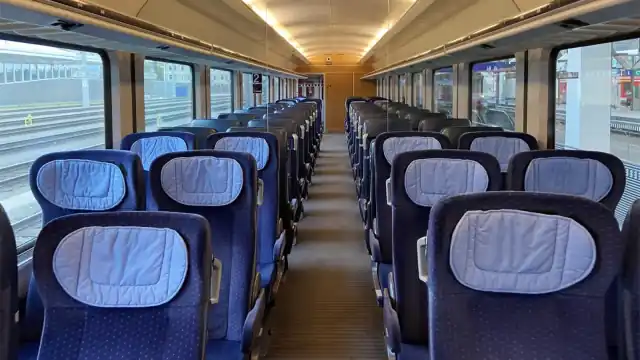
Sofia, Bulgaria – Starting Monday, August 19, the Bulgarian State Railways (BDZ) will introduce four newly delivered German passenger cars to its high-speed train service between Sofia and Varna.
This marks a significant upgrade in the country’s rail infrastructure, aiming to enhance passenger comfort and travel efficiency.
The high-speed train will depart from Sofia’s Central Station at 10:00 AM, featuring the new air-conditioned carriages. Simultaneously, another high-speed train, equipped with four additional new cars, will leave Varna at 9:25 AM.
These two trains will operate daily on the route from Sofia to Plovdiv to Varna and from Varna to Plovdiv to Sofia, providing a vital link between Bulgaria’s capital and its major Black Sea port.
This development is part of BDZ’s broader strategy to modernize its fleet by gradually integrating new rolling stock from Deutsche Bahn.
The railway carrier is keen on improving the travel experience for its passengers, focusing on comfort, reliability, and efficiency.
The new German passenger cars, known for their superior design and amenities, are expected to significantly enhance the overall journey.
According to BDZ, the new carriages are currently undergoing rigorous technical inspections and certification processes to ensure they meet all safety and operational standards.
Once these processes are complete, the wagons will be incorporated into passenger train services across the country, further expanding the reach of modernized rail travel in Bulgaria.
Travelers can purchase tickets for these upgraded services through various channels. Tickets are available at station ticket offices and specialized railway counters.
Additionally, BDZ offers an online ticketing system at https://bileti.bdz.bg/, allowing passengers to book their travel conveniently from anywhere.
To encourage more frequent use of the rail services, BDZ is offering a 20% discount on return tickets, providing a cost-effective option for round-trip travelers.
The introduction of the new German cars is seen as a positive step toward revitalizing Bulgaria’s railway system. With air-conditioned interiors and modern facilities, passengers can expect a more comfortable and enjoyable journey.
The deployment aligns with BDZ’s commitment to enhancing its service quality and meeting the evolving needs of its customers.
Passengers and industry experts have welcomed the move, recognizing the potential for increased rail travel popularity. The high-speed connection between Sofia and Varna is a crucial route, serving both business and leisure travelers.
The added comfort and reliability of the new cars are anticipated to attract more passengers, contributing to the growth of rail transport in the country.
As BDZ continues to roll out its new fleet, the focus remains on ensuring a seamless transition and maintaining high service standards.
The railway carrier’s efforts to modernize its rolling stock reflect a broader trend of investment in Bulgaria’s transportation infrastructure, aimed at boosting economic growth and connectivity.
In summary, the introduction of the new German passenger cars on the Sofia-Varna high-speed route marks a significant milestone for BDZ and Bulgaria’s rail network.
With enhanced comfort and efficiency, the upgraded service promises to provide a better travel experience for passengers, supporting the broader goal of modernizing the country’s transportation system.
This article was created using automation technology and was thoroughly edited and fact-checked by one of our editorial staff members
